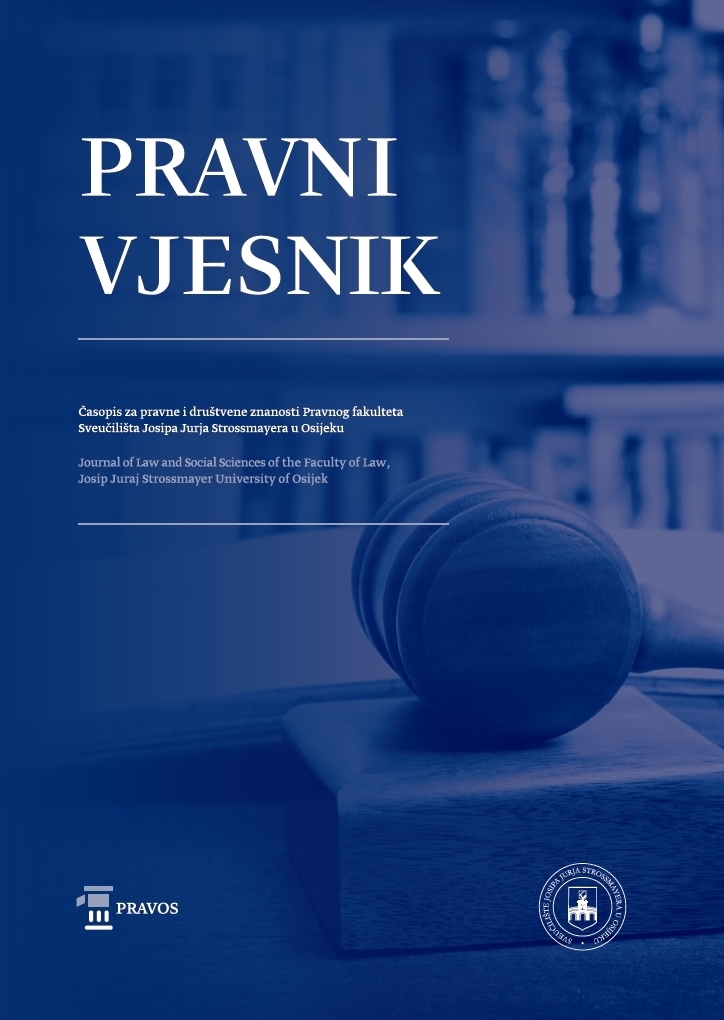CONSTRUCTIONS WITH FUNCTION VERBS AS A TRANSLATION CHALLENGE ON THE EXAMPLE OF GERMAN AND CROATIAN LANGUAGES OF LAW
DOI:
https://doi.org/10.25234/pv/25798Keywords:
structures with functional verbs, language of the law, problems in translationAbstract
The subject of research in this paper are constructions with function verbs in the German language of the legal profession (Funktionsverbgefüge – FVG) as a linguistic phenomenon that is culturally conditioned. The authors strive to prove that these structures represent a chal- lenge in understanding and translating legal texts from German into Croatian. As a complex structure whose verbal part has lost its original meaning, this construction often leads to mis- understanding and wrong translation of legal texts, which can lead to unwanted legal effects. This is well illustrated by the claim of our widely known legal translator Susan Šarčević: “Legal translation (...) leads to legal effects and may induce peace or prompt war.” The goal of this research is to shed light on the problems in understanding and translating such structures, to indicate to what extent the same structures are represented as their translation equivalents in the Croatian language, and which translation versions appear in Croatian as more stylistically acceptable solutions. The research corpus consists of examples of structures with functional verbs excerpted from the German Constitution (Grundgesetz) available on the website of the German Federal Ministry of Justice and their translation equivalents in the official transla- tion of that law in the Croatian language by Nina Sokol. The results of the research will widen knowledge in the field of legal language translation, and their practical value is in elucidating the difficulties in understanding legal texts in German that Croatian scientists and students in the field of law encounter in their research and scientific work, as well as court interpreters and translators who deal with legal texts in their professional work.
References
Blažević N, ‘Sintagme s funkcionalnim glagolima u njemačkom poslovnom dopisivanju u turizmu i njihovi ekvivalenti u hrvatskom’ (1995)1 Tourism and hospitality managment, 79.–87.
Flesicher W, Barz I, Wortbildung der deutschen Gegenwartssprache (Max Niemeyer, 2007)
Gläser R, Phraseologie der englischen Sprache (WEB Verlag Enzyklopädie, 1986)
Gradečak-Erdeljić T, Brdar M, ‘Constructional meaning of verbo-nominal constructions in English and Croatian’ (2012) 38/73 Suvremena lingvistika, 29.–46.
Helbig G, Buscha J, Deutsche Grammatik. Ein Handbuch für den Ausländerunterricht (Langenscheidt, 2001)
Heringer H. J, Grammatik und Stil. Praktische Grammatik des Deutschen (Cornelsen, 1995)
Hudeček L, Frančić A, Mihaljević M, Normativnost i višefunkcionalnost u hrvatskome standardnom jeziku (Hrvatska sveučilišna naklada, 2005) 112.–113.
Karabalić V, Pon L, Syntax der Satzglieder im Deutschen. Ein Lehr- und Arbeitsbuch (Sveučilište Josipa Jurja Strossmayera u Osijeku – Filozofski fakultet Osijek, 2008)
Kordić Lj, Marušić B ‘Funktionsverbgefüge (FVG) als Merkmal der deutschen Rechts- und Verwal- tungssprache’ (2017) 29/2017 Comparative Legilinguistics, 9.–30.
Kordić Lj, ‘Kurzwortbildungen als Merkmal der Deutschenrechtssprache’ (2013) Vol. 53 No. 2/2013 Linguistica (Zwischen) Sprache und Recht, 185.–197.
Kordić Lj, Barna Z, ‘Lingvistička obilježja njemačkog jezika u kontekstu prava Europske unije na primjeru Amsterdamskog ugovora’ (2019) Vol. 35, No. 3–4, Pravni vjesnik: časopis za pravne i druš- tvene znanosti Pravnog fakulteta Sveučilišta J. J. Strossmayera u Osijeku, 223.–241.
Lagumdžija Z, ‘Sintagma s funkcionalnim glagolom u njemačkom jeziku prava’ (2012) 3 Postscrip- tum. Časopis za obrazovanje, nauku i kulturu, 6.–12.
Mamić M, Temelji hrvatskoga pravnog nazivlja (Hrvatska sveučilišna naklada, 1992)
Marušić B, Funktionsverben in deutscher Konzernsprache. Neobjavljeni doktorski rad (Sveučilište J. J. Strossmayera u Osijeku, 2015)
Opačić N, Reci mi to kratko i jasno (Novi Liber, 2009)
Peti-Stančić A, Japirko H, Keži M, ‘Koliko su lagani tzv. lagani glagoli u hrvatskom?’ (2016) 2/20 Philological Studies, 202.–225.
Petrović V, Syntax des zusammengesetzten Satzes im Deutschen. Ein Arbeitsbuch (Školska knjiga, 2005)
Reiß K, Vermeer H. J, Grundlegung einer allgemeinen Translationstheorie, Serie Linguistische Arbeiten
(Vol. 147, Max Niemayer Verlag, 1984)
Rišner V, ‘Jezični savjeti Ljudevita Jonkea i suvremena hrvatska norma’ (2007) Vol. 54 (3) Jezik, 94.–104.
Sandrini P, ‘Translation zwischen Kultur und Kommunikation: der Sonderfall Recht’ in P. Sandrini (ed), Übersetzen von Rechtstexten – Fachkommunikation im Spannungsfeld zwischen Rechtsor- dnung und Sprache (Gunter Narr Verlag, 1999) 10.–45.
Silić J, Pranjković I, Gramatika hrvatskog jezika (Školska knjiga, 2005)
Silić J, Funkcionalni stilovi hrvatskoga jezika (Disput, 2006)
Šamšalović, Njemačko-hrvatski ili srpski rječnik (Zora, 1974)
Šarčević S, New Approach to Legal Translation (Kluwer Law International, 2000)
PROPISI I DOKUMENTI
Temeljni zakon (Ustav) Savezne Republike Njemačke. Prijevod s njemačkoga: Nina Sokol (Biblioteka Ustavi svijeta, knjiga 2, Pan Liber, 1994)
MREŽNI IZVORI
<https://www.gesetze-im-internet.de/gg/> pristupljeno 1. prosinca 2022.
Angelo Pizzuto, ‘Translation Procedures: The Technical Component of the Translation Process’,
<https://bit.ly/31E1vJA> pristupljeno 25. ožujka 2019.
Downloads
Published
Issue
Section
License
Copyright (c) 2023 Ljubica Kordić, Borislav Marušić

This work is licensed under a Creative Commons Attribution-NonCommercial 4.0 International License.
Authors retain the copyright on the papers published in the Journal, but grant the right of first publication to the Journal. Papers accepted for publication or already published in Pravni vjesnik of the Faculty of Law in Osijek may be published by the author(s) in other publications only with proper notice of its previous publication in Pravni vjesnik.






